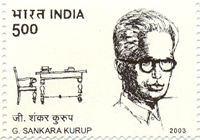- G. Sankara Kurup
Infobox Writer
name = G. Sankara Kurup

caption = A commemorative postage stamp featuring G.
birthdate = birth date|1901|6|3
birthplace = Nayathode,Kerala ,India
deathdate = death date and age|1978|2|2|1901|6|3
deathplace =Thiruvananthapuram ,Kerala ,India
occupation = Teacher, Poet, Essayist, Translator, Lyricist, Member of Indian Parliament
movement =
genre =
notableworks = Odakkuzhal (1950)
influences =
influenced =G. Sankara Kurup, (born
June 3 ,1901 , Nayathode,Kerala ,India -February 2 ,1978 ,Trivandrum , Kerala), better known as Mahakavi G (The Great Poet G), was the first winner of theJnanpith Award , the country's highest literary award [ [http://www.hinduonnet.com/fline/fl1603/16031170.htm Jnanpith] ] . He won the prize in 1965 for his collection of poems in Malayalam "Odakkuzhal" (The bamboo flute, 1950). With part of the prize money he established the literary award Odakkuzhal in 1968. He was also the recipient of the Soviet Land Nehru Award, in 1967, and thePadma Bhushan in 1968.After completing his education, Kurup worked as the Malayalam teacher in a secondary school in Thiruvillwamala in 1921. Later he became a teacher in the Government Secondary Teacher Training Institute near
Trichur . He worked as the Malayalam Pandit in Maharaja's College,Ernakulam , and retired as Professor of Malayalam from the College in 1956.Kurup published his first poem, called "Salutation to Nature" in 1918, while still a student. Apart from 25 collections of poetry, Kurup also wrote verse dramas and collections of literary essays -- in all about 40 works in Malayalam. He also translated into Malayalam the "Rubáiyát" (1932) of
Omar Khayyám , the Sanskrit poem "Meghaduta" (1944) ofKalidas , and the collection of poems "Gitanjali" (1959) ofRabindranath Tagore . Indeed, one often speaks of the influence of Tagore and Gandhi on the humanism and nationalism of Kurup. Interestingly, he has also been described as a “bard of science” who explores the role of science in achieving the human potential.He also penned the lyrics for P.J.Cherian’s "Nirmala", (1948), the first Malayalam film to incorporate music and songs.
Kurup also led an active public life as a member (1968-72) of
Rajya Sabha , the upper house of the Indian parliament.Work
"Poetry"
Suryakaanthi (Sunflower) (1933)
Nimisham (The Moment) (1945)
Otakkuzhal (Flute) (1950)
Padhikante Paattu (The Traveler's Song) (1955)
Visvadarsanam (The Sight of the Universe) (1960)
Moonnaruviyum Oru Puzhayum (Three Streams and a River) (1963)
Jeevana Sangeetham (The Music of Life) (1964)
Sahithya Kauthukam (The Sweetness of Literature), in 3 Volumes (1968)"Essays"
Gadhyopahaaram (Honouring with Prose) (1947)
Mutthum Chippiyum (Pearl and Oyster) (1958)
Ormayute Olangalil (In the Waves of Memory) (1978)References
External links
* [http://www.shelterbelt.com/KJ/malayalams2.html An overview of the major genres of modern Malayalam literature]
* [http://www.shelterbelt.com/KJ/malayabibli.html Bibliography of Malayalam Literature]
* [http://www.lib.washington.edu/Southasia/guides/malayalam.html Another Bibliography of Malayalam literature]
* [http://dsal.uchicago.edu/books/mahfil/pager.html?objectid=PK5461.A1M2_8_1_119.gifG. Sankara Kurup's Jnanpith Award Acceptance Speech]
* [http://dsal.uchicago.edu/books/mahfil/pager.html?volume=8&objectid=PK5461.A1M2_8_1_005.gifThe Poet's commentary on his work]
* [http://www.indiapost.gov.in/images/Stamp-Rel113.gifCommemorative Stamp released by India Post on October 9, 2003 (image)]
Wikimedia Foundation. 2010.
